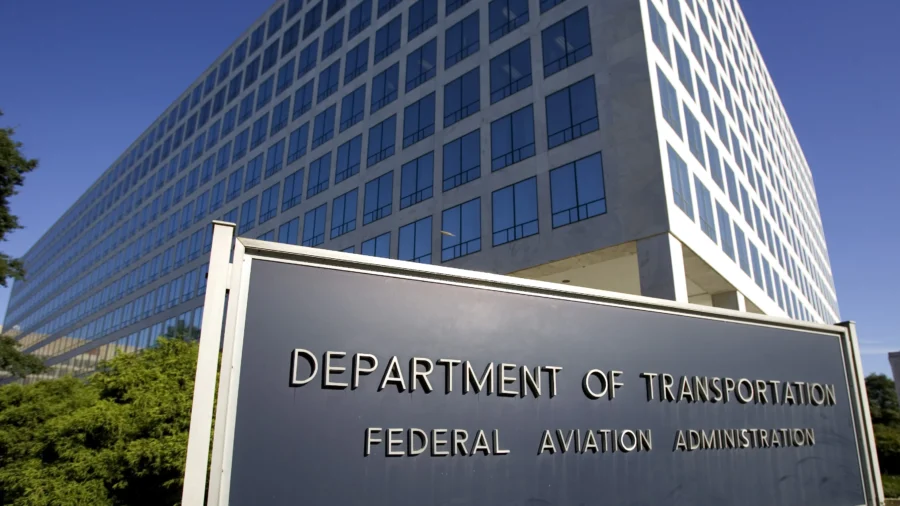Lawmakers in the U.S. Senate and House of Representatives reached a deal on the five-year, $105 billion Federal Aviation Administration (FAA) reauthorization bill just after midnight on April 29.
The bill enhances aviation safety standards and consumer protections, addresses hiring shortages and ongoing risk concerns at Air Traffic Control (ATC), and rejects a House proposal to raise the commercial pilot retirement age from 65 to 67.
The new guidelines come after ATC experienced multiple near-collisions of planes on several major airport runways in April.
The U.S. Justice Department is also considering criminal charges against Boeing after an Alaskan Airways flight suffered a door plug blowout on Jan. 5, requiring an emergency landing.
The company secured a deferred prosecution agreement with the Justice Department after two 737 MAX crashes in 2018 and 2019 that killed everyone onboard.
The window for Boeing to avoid additional incidents to fulfill the agreement was set to expire two days after the Alaskan Airways episode.
The FAA reauthorization bill also comes after months of negotiations between the Senate Commerce and House Transporation and Infrastructure Committees, with the first Senate procedural vote expected on May 1 to avoid the May 10 expiration deadline.
The four lawmakers who brokered the deal—Senators Maria Cantwell (D-Wash.) and Ted Cruz (R-Texas) and Reps Sam Graves (R-Mo.) and Rick Larsen (D-Wash.)—released a joint statement on April 29 regarding the 1,000-plus page bill.
“Now more than ever, the FAA needs strong and decisive direction from Congress to ensure America’s aviation system maintains its gold standard, and we have reached a bipartisan, bicameral, comprehensive agreement to do just that,” they wrote.
In a separate statement, Ms. Cantwell emphasized the importance of the FAA reauthorization bill.
“By getting a five-year reauthorization agreement for both FAA and NTSB, Congress is showing that aviation safety and stronger consumer standards are a big priority,” she said.
It is one of the last major pieces of legislation for Congress to pass before the November election, with both parties vying for control of the House and Senate in 2025.
One of the bill’s most controversial portions was adding 10 additional flight slot exemptions at Washington Reagan National Airport, which equate to five round-trip flights.
Some lawmakers worried this would add further congestion to the busy airport, especially after two planes on April 18 came within 400 feet of a runway collision due to miscommunications with Air Traffic Control.
A similar incident happened a day prior at JFK International Airport in New York City. Pilots on a Swiss Air flight had to slam on the breaks after air traffic controllers cleared the plane for takeoff while telling four other planes to enter the same runway.
In addition to requiring aircraft to use 25-hour cockpit recording devices to monitor pilots, the bill creates the Runway Safety Council, which will “develop strategies to address airport surface safety risks” while deploying “situational awareness technology” to prevent further runway collisions and miscommunications between Air Traffic Control and pilots.
Commercial pilot and aviation expert Juan Browne told The Epoch Times that one of the most critical factors impacting Air Traffic Control safety is insufficient staff.The bill acknowledges a 3,000-person shortage among air traffic controllers and pushes the FAA to ramp up staffing and set maximum hiring targets.
However, it will also compel the aviation administration to increase access to quality training by creating more “high-fidelity tower simulation systems in FAA air traffic control towers” to reduce the training backlog and speed up controller certification by 27 percent.
The move will require the FAA to hire more safety inspectors, engineers, and technical specialists every year, along with creating a hiring pipeline for veterans in roles such as civil aviation maintenance technicians.
The bill also expands the Aircraft Certification, Safety, and Accountability Act of 2020 with new transparency, oversight, and accountability requirements while implementing technology to protect aircraft from cyber security threats.
Some of the other changes include location and identity tracking for high-altitude balloons, guidelines to improve cabin air quality, better accessibility for disabled passengers, and new standards for consumer refunds.
Whenever airlines cancel or significantly delay domestic flights by three hours and international flights by six hours, they must display “easy-to-find refund request buttons on their websites.”
The Airport Improvement Plan will see an increase in funding from $3.35 billion per year to $4 billion to modernize airport infrastructure.
However, lawmakers scrapped Mr. Cruz’s proposal to allow members of Congress, Cabinet members, and judges facing credible threats to get security escorts and special screenings at airports.
Rep. Bennie Thompson (D-Miss.), who opposed Mr. Cruz’s security escort idea, said in a statement that “Congress should be focusing on improving TSA and keeping our skies more secure, not burdening its workforce and potentially diminishing security.”
In a statement to The Epoch Times, an FAA spokesperson said the agency does not comment on pending litigation.
From The Epoch Times


